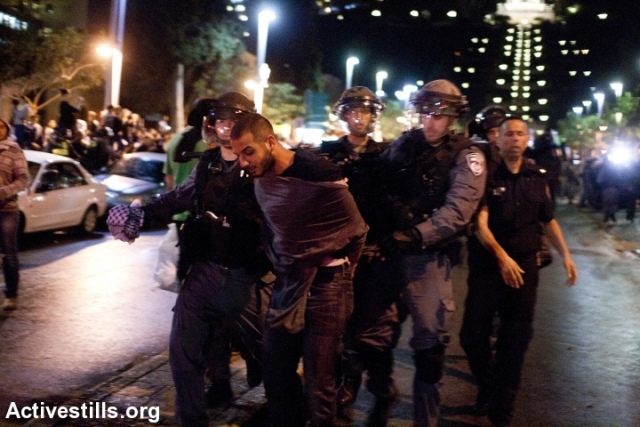Twelve activists arrested at Negev ‘day of rage’ protest are still in jail after more than a week; police are asking they be detained until the end of legal proceedings; activists fear the heavy handedness is an attempt to smother resistance to Prawer. Solidarity demonstration is held in Tel Aviv.

It has been more than a week since dozens of demonstrators were arrested in clashes between police and anti-Prawer Plan activists in the Negev town of Hura and in Haifa. Protesters detained at demonstrations in Israel are usually released the same day as the arrest or in the worst case scenario, the morning after. In the case of the anti-Prawer arrestees, police are asking the courts to hold 12 of these protestors, including five minors, in custody through the end of legal proceedings (criminal trials can take months if not years to make their way through the courts). In a show of solidarity with the detainees and in an effort to maintain resistance to Prawer, some 400 people marched through and blocked streets in central Tel Aviv Saturday evening.
One of the detainees, a young man from Tel Aviv who works in education and has no previous criminal record, was charged with rioting and shoving a police officer while already in the police station. The Be’er Sheva court has extended his detention several times already, the latest of them on Sunday morning.
“Compared with everything we know about arrests in demonstrations it is simply unbelievable that he is still inside,” the activist’s attorney, Smadar Ben Natan, said. “It’s complete madness that for charges such as these police are asking for detention until the end of proceedings, which might take ages.”
“They’ve pulled out all the possible excuses, saying he might be dangerous to the public, might flee the country or destroy evidence as if he was some sort of criminal,” she continued. “In any other case he would simply walk [free] after two days, tops. The only exception to that rule is when the state wants to put down massive protests, as we last saw during Operation Cast Lead. Then the police start making mass arrests and the courts quickly fall in line, jailing people for extended periods of time.”
Anti-Prawer activists have been warning for quite some time now that a significant part of the plan is the inclusion of “emergency legislation” type measures, including ones that limit the right to appeal decisions to destroy homes in court, forcing demolition contractors to sign agreements preserving the plans’ details as state secrets (Hebrew) and establishing a special enforcement unit within the Public Security Ministry that will be responsible for the eviction of 30-70,000 Bedouins from their homes.
“The violence used by police in the protests and the prolonged arrests [demonstrate] the oppression inherent in the Prawer Plan itself,” said Hagar Sheizaf, member of the campaign’s media team. “This is a direct continuation of the lack of communication with members of Bedouin society, who are being treated as non-citizens. When J14 social protest demonstrators broke bank windows in Tel Aviv they were released the next day – and here people are still detained for much less.”
Haaretz, too, found the prolonged detentions to be a warning sign and in its Sunday editorial called to “free the Negev demonstrators.”

In addition to the prolonged detention of activists, police also attempted to pull off an almost unprecedented breach in protocol last week. Acceding to a police request, a Be’ere Sheva court ordered all photographers present at the Negev demonstration to hand over their pictures to police for the benefit of their criminal investigations. This caused outrage in almost all media outlets and in the Union of Journalists in Israel (UJI), which made a statement indicating the severe implications such a warrant would have on freedom of the press and on source confidentiality.
The A’a-lam Center for Arab Media, several outlets and the UJI appealed to the court to cancel its order, but just hours before the hearing, police backed down and asked the court that the order be withdrawn.
Put together, with the arrests and the intense harassment of activists before the last “day of rage,” it looks like persecution of the opposition to Prawer is just beginning, and the worst might still be ahead of us.
Related:
Anti-Prawer ‘day of rage’: Chronicle of a violent confrontation foretold
Beaten, arrested, threatened: A personal account from the anti-Prawer protest

